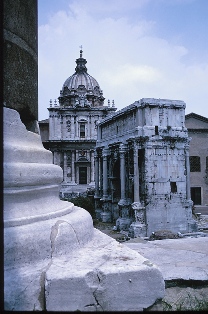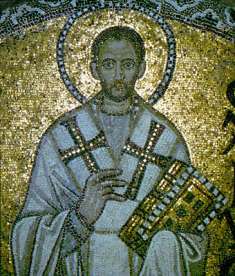By Michael Cline
The voices of the ancients have something to teach us. It can be refreshing to delve into history to learn something new, which isn’t new at all. This is a look at an old church father who expresses an idea central to Wrecked – faith is nothing without action.
Joel Osteen preaches to over 30,000 congregants every single week. Billy Graham has been the voice of the evangelical world for nearly 70 years and the spiritual advisor to more than a few presidents. Rob Bell has been tagged by many as the next Billy Graham for the postmodern generation and can be found on library shelves, media collections, and Internet podcasts. All of these men can speak truth into our lives and capture our hearts and minds with their ability to communicate the gospel. But when is the last time you heard any of them described as having a mouth like precious metal?

Sure, they can preach a bit and have a ton of people behind them to prove it, but can they live up to the reputation John Chrysostom (349 – ca. 407) carried around in his day? The saints surname chrysostomos literally means golden-mouthed, and he was largely branded as the best preacher in the early church. Long after Your Best Life Now has made its run on the best-seller list, and Sex God has created enough dialogue to fill a few blogs, the writings of a preacher like St. John Chrysostom will still be read and expounded upon. What can we learn from such a classic orator?
If Brother Lawrence was the non-monkish monk, Chrysostom is his opposite. Its reported that he suffered from permanent stomach and kidney damage related directly to his ascetic practices. He was an extreme hermit who spent two years standing up, not sleeping, while committing the entire Bible to memory. And despite such an eccentric life, Chrysostoms preaching is not all that lofty. In fact, one of the things that made him so widely popular in his day was his ability to speak plainly on the biblical text. Now to us, his writings come off as anything but easy to read and plain. But in the day he lived, to bypass all the allegorical mumble jumble and speak straight up about Gods Word, was a welcomed change compared to the sophists running around from town to town.
Chrysostoms Instructions to the Catechumens is divided into two separate letters. His pupils on this occasion are those about to be illuminated, which was his way to describe those in the final stage of preparation in order to be baptized. For Chrysostom, baptism was a serious mark in the life of the believer. He writes For ye are not about to be led to an empty dignity, but to an actual kingdom; and not simply to a kingdom, but to the king of the Heavens itself. Baptism marked the coming out party of the believer into the Kingdom of God and into the fellowship of believers. In todays church, perhaps we can learn a few things from the golden boy when it comes to this sacrament. Is baptism merely a ritual, an outward sign we perform to satisfy an edict from Jesus? Or is it possible that the baptismal (the laver), does not simply wipe the vessel clean, but entirely remolds it again?
Whats the purpose of such a study group? Why even prepare and discipline ourselves before coming to the pools of baptism? Often times in our present day churches, baptism is seen as just another step after we get saved. But this is not the case to Chrysostom. For thirty days, this group was in training to be illuminated. The master teacher compared this spiritual class to that of a wrestling school, both for exercise and practice. After baptism, a fight was going to go down between the believer and that evil demon, Satan. Chrysostom goes on to say that we have to prepare to box and fight such an aggressive enemy. We have to learn his methods of wrestling ahead of time so we can have courage to defeat him in spiritual battle. All of this before being baptized!
 In his second letter, the master teacher begins by asking for some fruit from those wishing to be baptized. He doesnt desire apples or orangeshe wants to see some good works and some positive advances in their spiritual lives. A real man is not someone with hands, feet, and logic. A man is whosoever practices piety and virtue with boldness.
In his second letter, the master teacher begins by asking for some fruit from those wishing to be baptized. He doesnt desire apples or orangeshe wants to see some good works and some positive advances in their spiritual lives. A real man is not someone with hands, feet, and logic. A man is whosoever practices piety and virtue with boldness.
Its the new believer’s chance to show Chrysostom that they have taken his words and teaching to heart and applied them since they have last come together. But those that have not done so hot in piety are about to catch a break, because according to Chrysostom, even Paul increased in the good things because of his zeal and diligence.
The believers are not about to be dunked in stale pools, but in the living water of the laver. It is in this method that they are able to extend their holiness, an idea foreign to many streams of Christianity today.
But once we have been immersedor sprinkled or poured upon; however you baptize, we can put away craving for the things of this life. Chrysostom describes how it is Christ himself who becomes our home, our wine, our tables, and our bridegroom. Chrysostom is trying to get across is that discipline and righteous living isnt something we can dismiss and sit on our hands about. True, He who calls you helps clothe you in the type of garments you are to wear to the banquet; after all, thats called grace. But we are to ready ourselves in order to preserve the majestic robe we receive, for this kind of raiment is nowhere sold.
And if any man be effeminate, or a fornicator, or an idolator, or a doer of whatever ill you please, or if he be full of all the wickedness there is among men; should he fall into this pool of waters, he comes up again from the divine fountain purer than the suns rays. -St. Chrysostom on the laver of regeneration
